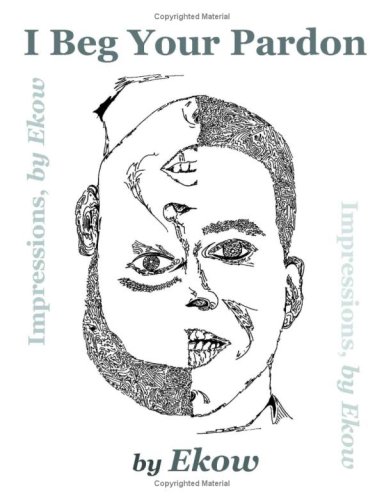I Beg Your Pardon

|
Author:
Ekow Acquah-Asare
Price:
$ 21.97 (new)
$ 21.39 (used)
Medium:
Paperback (152 pages)
Publisher:
Trafford Publishing
2004-06-09 |
Editorial Description
A book about the author's art and life experiences, written in a way we can all relate to.
Reader Reviews
Unique Art & Stories
This book contains interesting stories from Ekow's experiences. Some are fairly straight forward, some are more open to interpretation. The same can be said for his artwork - also in this book. He has a unique style and uses a pen and ink medium.
Some of the abstract pieces are a little unsettling. Maybe they were meant to be? Maybe that's why I like them. Anyway, what would make it better? More in depth stories. I'm sure the stories are simply to enhance the art, but I find myself wanting more story telling. Let me hear more cultural details.
Nice first work. What's next?
 Talented artist, master storyteller.
Talented artist, master storyteller.
I first encountered Ekow's artwork thanks to a neighbor across the street. Then in her late 70s, one day she said, "Brad, I have to show you my friend's doodles." The doodles, as she called them, were the drawings included in the book. Solid black pen strokes on 11" x 14" white paper, the strokes were intricate, almost violent individually, but taken as a whole, resulted in beautiful depictions. "He's writing stories to go with each one," she told me. Eventually, she introduced me to David (his American name) and his wife, Heidi. I recognized them as parents of two of the most well-behaved kids in the neighborhood, and they had a very young one that wasn't outside as much. Both immigrants, David from Ghana and Heidi from Holland, they had come to America and built their own American dream, complete with a home, 3 kids, and a dog.
I had recently gotten a dog and purchased my home, and would see David out in front of his home with his dog quite often. We'd walk around the neighborhood discussing ideas and dreams and big plans. What I found was someone who'd come from the other side of the world, yet had the same kinds of entrepreneurial aspirations as I did. As they were finding a publisher for this book, they were creating greeting cards and prints of his "doodles", visiting art shows, trying to share his work and make some money in the process. He was working as a test engineer for a local high tech company. She was raising the kids, schooling the oldest one at home for awhile to challenge her, and thinking about going back to school to become a nurse.
It wasn't until a year or so later that I finally read David's book. One day, I dropped by to visit with him and he asked me, "did you ever read my book?" Of course, the answer was, "you never asked me to!" So I sat on a couch for an hour or so and read a few of the stories in I Beg Your Pardon. I'm not one to get too emotional over touching stories, cry at weddings, etc. But there is a story in there about a little joke one of his college buddies played on him that assured me that the world was alright. Although I was intrigued by his art work, I was mesmerized by his story telling!
David has become a very good friend over the past few years. While this is the only thing he's had published, he has shared more creative ideas with me than any one person should be allowed to have. Should any of those ideas make it to market as a published book, you can expect it to be even more thought provoking than I Beg Your Pardon. If anyone could write a story about Africa that wasn't red ribbons and tribal war and famine and slaughter, it's David. And it's an important story to tell, because Africa will be a stronger focus, good and bad, of international attention in the coming years. If you want to know the whole story of Africa, who better to hear it from than someone from Africa?
I Beg Your Pardon is a great coffee table book. If I saw this on a coffee table and had never seen it before, I might assume from its cover that it was a politically correct book meant to show the political sensitivity of the coffee table's owner. Far from it. It's personal stories about a guy who started life in Africa, came to study in America, and stayed to pursue the American dream. A son of a chief, who enjoyed tremendous privilege in his native country, and came to America to carve out his own privilege. Another story in the book is about how the throne is handed down in his native culture. It is passed not to sons, but to nephews, precluding David from ever becoming top banana, but ensuring that rulers consider their extended families over their narrow interests. It's stuff like that you'd never learn in school, but you will by reading I Beg Your Pardon.

 Talented artist, master storyteller.
Talented artist, master storyteller.